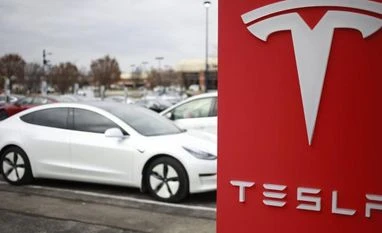Tesla Inc's ability to design components in-house gave the automaker agility in making tweaks to parts and coping with supply chain issues that hit other automakers much harder, sources and experts said.
Tesla boosted its deliveries by 87% to a record high in 2021, pushing up its shares up over 13% on Monday.
Here are some of the ways Tesla navigated supply chain challenges.
HOW TESLA COPED WITH THE GLOBAL CHIP SHORTAGE
Tesla told some customers they could take vehicle delivery with some missing parts, such as Bluetooth chips and USB ports. Tesla also removed some features such as radar sensors and lumbar support for front passenger seats, which made the car less complicated to build. Tesla did not respond to Reuters' request for comments.
Tesla also increased vehicle prices to address higher costs, including "expedite costs" for parts. American consumers have to wait for seven months if they order a Model Y version, whose prices went up 18% last year.
More From This Section
Tesla chief executive Elon Musk said Tesla was also able to substitute alternative chips for some that were in short supply. Volkswagen CEO Herbert Diess said Tesla's ability to rewrite software to support the new chips in 2-3 weeks was impressive.
HOW TESLA IS DIFFERENT FROM OTHER AUTOMAKERS?
Tesla designs more hardware and writes more software than many rivals, who rely on auto suppliers' efforts. Musk has called the company "absurdly vertically integrated compared to other auto companies."
"We design circuit boards by ourselves, which allow us to modify their design quickly to accommodate alternative chips like powerchips," a Tesla insider said.
In-house engineers design the bulk of the complex software that runs the Tesla vehicles, which Musk has described as a "computer on wheels".
Tesla also designs the chips used in its driver assistant systems and makes parts ranging from seats to battery cells in-house. It also owns its own direct sales, service and charging networks.
"We're designing and building so much more of the car than other OEMs (original equipment manufacturers) who will largely go to the traditional supply base and like I call it, catalog engineering. So it is not very adventurous," Musk said.
Ambrose Conroy, CEO of Seraph Consulting, said: "They control what's going on in that vehicle at a level that no other automaker wants to do it. It is much more aligned to the integration that Henry Ford had originally with the Model T."
HOW TESLA SECURED CHIP ORDERS
In 2020, many automakers cut chip orders as the pandemic and lockdown measures hit demand. But Tesla never reduced its production forecast with suppliers, since it expected rapid growth, which helped it weather the chip shortage, Tesla chief financial officer Zach Kirkhorn has said.
"They've just been smarter about it than other companies in terms of making sure there's buffer stock," a Tesla supplier executive said.
Tesla's direct ties with chip suppliers allowed it to move faster than traditional automakers, which rely on first-tier suppliers who have relationships with chipmakers, Kevin Anderson, Principal Consultant at Write-Tek, said.
(Reporting by Hyunjoo Jin; Editing by Peter Henderson and Richard Pullin)
)